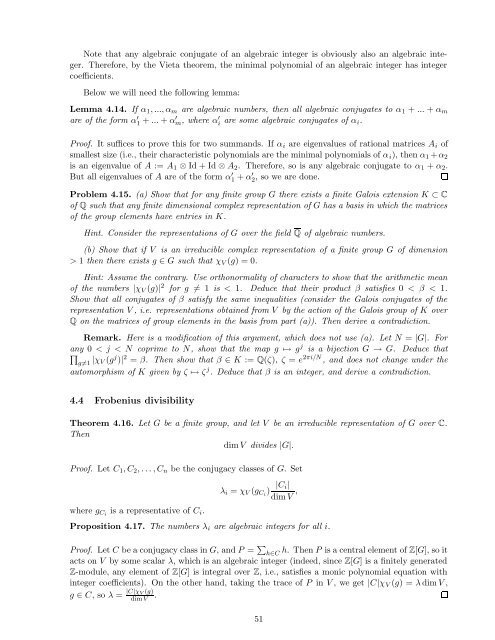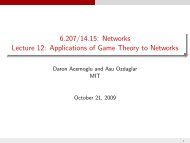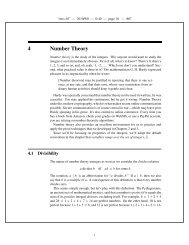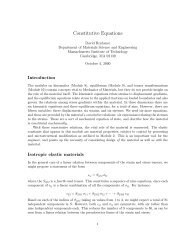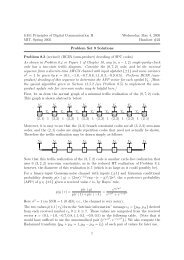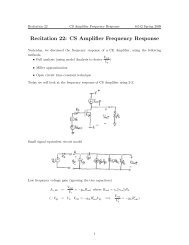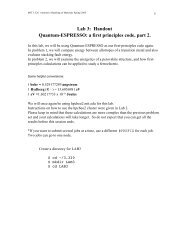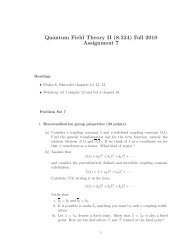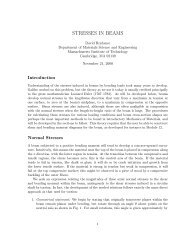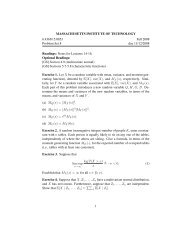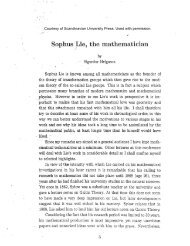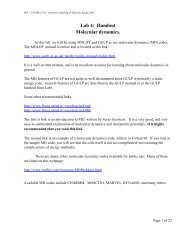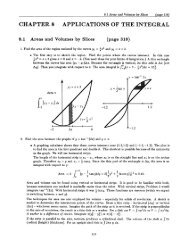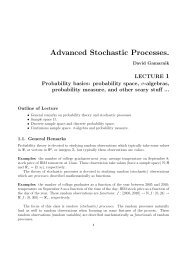Lecture notes for Introduction to Representation Theory
Lecture notes for Introduction to Representation Theory
Lecture notes for Introduction to Representation Theory
You also want an ePaper? Increase the reach of your titles
YUMPU automatically turns print PDFs into web optimized ePapers that Google loves.
Note that any algebraic conjugate of an algebraic integer is obviously also an algebraic integer.<br />
There<strong>for</strong>e, by the Vieta theorem, the minimal polynomial of an algebraic integer has integer<br />
coefficients.<br />
Below we will need the following lemma:<br />
Lemma 4.14. If ϕ 1 , ..., ϕ m are algebraic numbers, then all algebraic conjugates <strong>to</strong> ϕ 1 + ... + ϕ m<br />
are of the <strong>for</strong>m ϕ 1 + ... + ϕ m, where ϕ i are some algebraic conjugates of ϕ i .<br />
Proof. It suffices <strong>to</strong> prove this <strong>for</strong> two summands. If ϕ i are eigenvalues of rational matrices A i of<br />
smallest size (i.e., their characteristic polynomials are the minimal polynomials of ϕ i ), then ϕ 1 + ϕ 2<br />
is an eigenvalue of A := A 1 Id + Id A 2 . There<strong>for</strong>e, so is any algebraic conjugate <strong>to</strong> ϕ 1 + ϕ 2 .<br />
But all eigenvalues of A are of the <strong>for</strong>m ϕ 1<br />
<br />
+ ϕ 2 , so we are done.<br />
Problem 4.15. (a) Show that <strong>for</strong> any finite group G there exists a finite Galois extension K → C<br />
of Q such that any finite dimensional complex representation of G has a basis in which the matrices<br />
of the group elements have entries in K.<br />
Hint. Consider the representations of G over the field Q of algebraic numbers.<br />
(b) Show that if V is an irreducible complex representation of a finite group G of dimension<br />
> 1 then there exists g G such that ν V (g) = 0.<br />
Hint: Assume the contrary. Use orthonormality of characters <strong>to</strong> show that the arithmetic mean<br />
of the numbers |ν V (g)| 2 <strong>for</strong> g ⇒ = 1 is < 1. Deduce that their product α satisfies 0 < α < 1.<br />
Show that all conjugates of α satisfy the same inequalities (consider the Galois conjugates of the<br />
representation V , i.e. representations obtained from V by the action of the Galois group of K over<br />
Q on the matrices of group elements in the basis from part (a)). Then derive a contradiction.<br />
Remark. Here is a modification of this argument, which does not use (a). Let N = | G | . For<br />
any 0 < j < N coprime <strong>to</strong> N, show that the map g ⊃ gj<br />
⎛<br />
is a bijection G ⊃ G. Deduce that<br />
2<br />
g=1 ∞<br />
|ν V (g j )| = α. Then show that α K := Q(ψ), ψ = e 2νi/N , and does not change under the<br />
au<strong>to</strong>morphism of K given by ψ ⊃ ψ j . Deduce that α is an integer, and derive a contradiction.<br />
4.4 Frobenius divisibility<br />
Theorem 4.16. Let G be a finite group, and let V be an irreducible representation of G over C.<br />
Then<br />
dim V divides | G | .<br />
Proof. Let C 1 , C 2 , . . . , C n be the conjugacy classes of G. Set<br />
where g Ci is a representative of C i .<br />
∂ i = ν V (g Ci ) |C i| ,<br />
dim V<br />
Proposition 4.17. The numbers ∂ i are algebraic integers <strong>for</strong> all i.<br />
Proof. Let C be a conjugacy class in G, and P = ⎨ hC<br />
h. Then P is a central element of Z[G], so it<br />
acts on V by some scalar ∂, which is an algebraic integer (indeed, since Z[G] is a finitely generated<br />
Z-module, any element of Z[G] is integral over Z, i.e., satisfies a monic polynomial equation with<br />
integer coefficients). On the other hand, taking the trace of P in V , we get | C|<br />
ν V (g) = ∂ dim V ,<br />
|C|α V (g)<br />
g C, so ∂ = .<br />
dim V<br />
51


